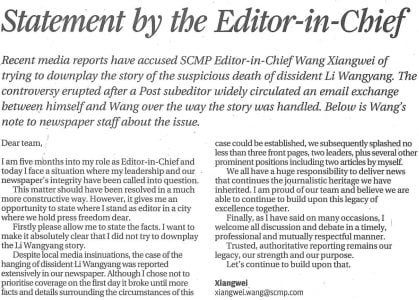With more than 20% of the world’s population, it would not be surprising that China has over a fifth of its disaster, outrage and tragedy. And, oh boy, does it deliver. There is only so much you can read about municipal street patrols killing hawkers, blind activists escaping house arrest, despotic provincial warlords’ wives murdering foreign fixers and physically disabled dissidents mysteriously committing suicide.
For many of us in and out of Hong Kong, the South China Morning Post is as dependable a source as any for one-stop, day-to-day coverage of the mayhem. The supposed suicide of Li Wangyang was a case in point; the paper’s full-length reports on the case were almost certainly exhaustive enough to lead many readers to skip bits halfway through and still not have time for the latest tainted milk and poisoned lake stories. (For relief from the non-stop horror I recommend a weekend in Zhongshan, Guangzhou or someplace where life seems blissfully normal, everyone is happy and nobody seems to get tortured. They don’t even have anyone carrying mountain-size bundles of plastic bottles on bicycles. It’s a big country.)
Such is the torrent of pandemonium coming out of the Mainland that many of us wouldn’t notice an occasional delay in the reportage. Indeed, all print media content is late in this day and age; the SCMP presumably publishes all its international coverage for the benefit of readers who are not on the Internet – I’ve already read it online the day before. But apparently Asia’s century-old ‘newspaper of record’ was tardy in covering the Li case, and deliberately. Thus we have this year’s ‘self-censorship at the SCMP’ flurry, here, here and here, and in much of the other local press, happy to pick on their rival and its sort-of Communist-linked  editor (Wang Xiangwei, ex-BBC and current member of the Chinese People’s Political Consultative Congress talking shop).
editor (Wang Xiangwei, ex-BBC and current member of the Chinese People’s Political Consultative Congress talking shop).
When the story first broke, the SCMP had a big report written, which was then spiked in favour of a tiny snippet before normal service resumed the following day. Looks like a pretty clear case, until you stop to ask: why the Li story? Why not the Bo Xilai story – a vivid example of the inevitable rottenness of a one-party system – or Chen Guangcheng, a story of even greater injustice than Li’s? And what purpose would be served by ‘nibbing’ the story, other than making the editor look stupid? (As if that striped shirt/spotted tie combination weren’t bad enough.) A thousand other outlets ran with it and told the world.
I guess it is theoretically possible that the SCMP’s proprietors, Malaysia’s tycoon Kuok family, alarmed at the incessant flow of Chinese cruelties in their organ’s pages, told Wang to spike the next one, and – mindful that the life expectancy of an SCMP editor is around 18 months – he complied. And it’s theoretically possible that Party Central sent him a 24-hour gagging order on this specific tale of nastiness. But it looks just as likely that the guy goofed up, possibly unaware that rival newspapers were going to make a big splash on this particular human-rights atrocity du jour. Which is unforgivable but not evil. (The snappy email to a complaining staff member suggests a humiliating loss of face has occured.)
Self-censorship at the SCMP seems to come around every few years in a smoke-but-no-fire sort of way. Apart from the departure of China editor Willy Lam for tycoon/Beijing-related lèse-majesté, most allegedly sinister disappearances of SCMP journalists seem to have been only tangentially political. The two other most-cited examples, long ago, were of a clichéd cartoonist and unfunny humourist and were, if anything, overdue.
One example of self-censorship in the Big Lychee that I know of was at Time Out HK earlier this year, and that backfired, with a bowdlerized print run apparently being withdrawn and pulped – and the upheavals over that are barely over. Other examples in the past concern negative coverage of tycoon Li Ka-shing’s businesses, which also happen to be mega-advertisers in the local press. Otherwise, any hint of it provokes instant, loud, local and international alarm. In an age with a million instant, uncensor-able information channels, the only reason a Hong Kong newspaper proprietor would seriously censor his economically precarious plaything is by way of a masochistic display of loyalty to Beijing. It no doubt happens, and Beijing is no doubt as unimpressed as ever. By definition we can’t say whether anything earth-shattering was ever covered up from the planet by a Hong Kong publication, but it seems unlikely.
Talk about futile. Want to self-censor? Fine – we stop buying and reading.


I was surprised you hadn’t raised this one earlier. Apparently the local press are full of what has transpired at the SCMP. Sad that the issue seemingly means more to Chinese readers than it seems to the SCMP’s own audience.
and Chinese readers are not the SCMP’s own audience ?
Raeders of Chinese are less likely to read the SCMP let alone know it exists JB.
Maugrim,
You are totally out of touch. Most locals know scmp exists
Wonder what job security sub-editor Alex Price has now after having the temerity to question Uber Editor Wang?
Is it that the SCMP is just like the rest of local English language media and not very good or is something a little more underhand going on? Difficult.
How we groan when ATV Chugani’s fails to ask the obvious question or why TVB’s Pearl report would have some pointless crap in the middle of a major story of local interest. Similiar groans regarding RTHK and well the Standard is just full in your face.
A few to many instances have struck me with the Post down the years. The one which springs to mind was the disrupting China’s olympic torch procession 4 years ago. It was mainly Tibetian supporters who were responsible however you would not have known this if you read the Post on the particular day I picked up the paper.
The self censorship is subtle but its there.
People still read the Pro China Morning Post? I seem to recall my subscription ending about the time that the “clichéd cartoonist and unfunny humourist” got fired – the former for running cartoons about China’s organ harvesting from executed prisoners, if memory serves.
Or maybe it was when they axed sub-editor Danny Gittings for complaining about their (lack of) Tiananmen coverage.
Or maybe it was when they forced out Jasper Becker, their very good but apparently not pro-enough Peking correspondent.
But I’m pretty sure it was by the time they got rid of the excellent Willy Lam. In the words of a sign seen at the SCMP office the day Lam left: “SCMP cuts off its Willy”. Indeed.
The atmosphere around the SCMP office – now in the cheap distant bowels of an industrial estate in Tai Po, which as we know is where all the news happens – is toxic. This isn’t a newspaper any more, it’s low-quality fish wrapper. Will the last gweilo to leave please turn off the lights?
Hemmers, are you suggesting that a decision to self-censor would be based on a logical, level-headed analysis of the situation at hand? I think it’s often far simpler than that: an instinctive act of sycophancy driven by dependency, love and fear, similar to a domesticated animal’s need to ingratiate itself to its master. Having said that, the more ambitious or ruthless human will generally be thinking about the future promise of money or influence.
It seems that Wang Xiangwei has not really replied to the journalists’ request: “We hope that you will assure us … we will continue to enjoy a free working environment”.
After a few years when the editorials were too intimidated to hint at the least implicit criticism of China, since Wang’s arrival the situation has perhaps improved a little. But the SCMP still faithfully reports in full the official announcements, even when manifestly absurd or mendacious.
Let’s be honest the SCMP is well past it’s prime and incapable of investigative journalism. I reckon on given day nearly 50% of the content is dated stuff taken from the Internet.
Why is there such an anti-SCMP streak running through people who claim they don’t read it? Are their letters to the editor never published, thus generating venom and anger?
Calling it Pro-China is a lazy and inaccurate insult indeed, as anyone who reads its China coverage will know.
what China should realize that if there is no even one credible English newspaper in H K covering sensitive issues in China, serious readers will turn to foreign newspapers like Wall St. Journal or Financial Times for more analytical writings. Such a trend if runs in that direction, H K’s reputation as a financial center won’t stand up to challenge. If freedom of speech goes, where is academic freedom? Once the stage is arrived, H K is just another Chinese city, as so predicted by Mr. Lee Kuan Yew before 1997.
SCMP is becoming another China Daily or better known as South China Mourning Post.
I guess you watched the movie of Kevin Costner: Dance with the Wolf. It will be played daily in H K from July l st: CY Leung (the wolf) will be in charge.
You were saying?
“Prize-Winning Reporter Driven out of SCMP”
http://www.asiasentinel.com/index.php?option=com_content&task=view&id=4642&Itemid=173
“There are now no foreign reporters working for the South China Morning Post in China–a first in a long while.”
soon there will be a communist party cell in that newspaper having weekly meetings. Hong Kong journalists will be side-lined. One Country same system. You might as well read the Reg Flag about what’s going on in China.
SCMP: Serving China’s Mouthpiece Post.
SCMP reinforces China’s obsession that any criticism in public media is motivated by Anti-China conspirators who try in concert to subvert China’s authority in H K. Particularly foreign influences fuel the process and those elements have to be eliminated. To that extent, the media has to be controlled or quarantined at all costs. SCMP is the tip of the spear in the English-speaking media.
It serves SCMP’s purpose to get rid of foreign journalists on its staff. One of my friends is a Eurasian (father Chinese and mother European). In the 1950’s, he worked with the Chinese (Mainland) magazine published in English at its Beijing office. When Zhou En-lai came to visit the magazine headquarters, all the staff were gathered to take a group picture with Zhou. He was asked not to be present in the picture-taking ceremony because the Chinese authorities wanted to show that China did not need foreign expertise in publishing. My friend had Caucasian facial features. How ridiculous. Now this is happening in the H K SAR.